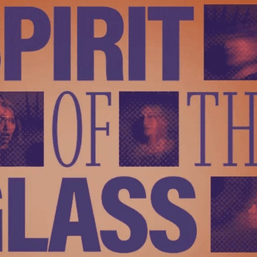SUMMARY
This is AI generated summarization, which may have errors. For context, always refer to the full article.

“You will get separated!” a star-spangled DJ (Moses Villarama) on high announces to those of us on the floor as club music pulses throughout Broadway Theatre.
Ushers with batons as vibrant as their pink jumpsuits guide us as the stage rotates, priming us for the participation rules of Here Lies Love, a new iteration of David Byrne and Fatboy Slim’s 2013 musical charting the trajectory of former first lady Imelda Marcos from impoverished province girl, to excessive socialite, to expelled dictator’s wife.
It’s standard to guide an audience through an immersive show this way, but my stomach churns. Everyone around us seems to have a moment of pleasant confusion, unsure of the rules but ready to play, not minding severance from their companions. But I reach for my friend’s hand and hold it tight, thinking of our respective Filipino families. Displacement, corruption, graft, exile, torture, censorship, curfew, incarceration, state violence, imperialism, American occupation, greed: my family’s oral history of Martial Law courses through my mind and clashes with neon lights, accelerating disco, bemused faces following the stage. With this hypnotic, purple-blazed moment of an authority declaring our inevitable division, a discordant spectacle plays out on the dance floor.
The discord lies in the fabulousness of the spectacle, a world dripping with sequins and rainbows as it pays homage to Philippine obsessions with pageantry. Clint Ramos’ costumes are immense and multi-hued, a dazzling array of proud ternos and suits that make Annie-B Parson’s choreography even more glittery and dizzying. Multiple-screen projections (designed by Peter Nigrini) flash a disturbing fusion of historical fact, artistic license, and live camera feeds as campaigners thread their way through the audience, blending truth and myth into one mega-dance party. Alex Timbers’ direction is innovative for Broadway, causing those of us on the floor to swivel around to witness the action while politicians and bomba starlets skitter through the upper echelons of the audience.
Yet this aesthetic serves to prop up an otherwise superficial pop song cycle, using Imelda Marcos as a muse for love and romance while the deeper politics of the Philippines burn in the background, occasionally thrusting out as shock value for the audience. Historical events such as the Plaza Miranda bombings (fog floods the stage, police bring batons down on protestors) and the loud gunshot signifying Ninoy’s murder live as mere unmetabolized moments, the songs in a hurry to move on and keep the dance floor throbbing.
The conjugal dictatorship and Philippine history are distilled into a love triangle between Imelda, Ferdinand, and Ninoy, though it’s less a triangle and more of a set of dyads, as the relationship between the two men remains flat and unexplored, despite their law school frat days at the University of the Philippines. Under Timbers’ direction, fresh-faced Imelda (Arielle Jacobs) is all rose and no thorns, a belting voice in love with love who is rebuffed by the youthful and ambitious Ninoy Aquino (Conrad Ricamora). Apparently, it’s for being too tall, but when a magnetizing Miss Philippines (Kristina Doucette) walks onstage and Ninoy escorts her off, the image simultaneously equates Imelda with the nation and feminizes the Philippines as a sexually desirable woman ready to give Ninoy what he needs that Imelda cannot.
When Imelda later visits the jailed senator, she sings, “you were my first love / but you said I was too tall,” gaining a laugh from the audience that highlights deeply unaware pettiness while also trivializing the oppression faced by Marcos’s opposition. If only one man’s beauty standards were different, or one woman’s genetics rendered her more petite, then we would not be in this chaos! This moment obscures deeper political conflicts within the regime and throughout the Philippines beyond Manila, but of course, this is just a pop song on a concept album.
Marcos (Jose Llana) mixes charisma and threat, most evident when walking through the crowd and shaking their hands, drawing the audience on the floor into the gaze of the cameras, projecting them onto the walls for the audiences above. He morphs into a tired, weakened philanderer, with the events gaining momentum when Ninoy’s mother, Aurora Aquino (Lea Salonga), takes the stage, singing “Just Ask the Flowers.” The draw is less about the historical figure of Doña Aquino or outrage over Ninoy’s death, but rather the presence of Salonga herself, who first graced the Broadway Theatre as the Vietnamese bartender Kim in Miss Saigon. For folks following Salonga’s journey as a pop culture icon, there’s a sense of completion in seeing her play a more noble role, and a Filipino one at that.
Here’s where more of the messiness and discord of Here Lies Love breaks through: in its mix of real-world stories of Filipino and Filipino-American pride and despair, its controversial production history and present (most recently, the move to use tracks instead of live musicians), and questions surrounding why this show emerges now, one year into the presidency of Bongbong Marcos and after decades of documented historical distortion to clean up the Marcos family image. It’s precisely the mash-up of art, culture, history, hyperbole, denial, and facts that have created an authoritarian nostalgia in the Philippines. And to evoke this seductive nostalgia in an American audience, real quotes and transcripts are used in the songs that fill the mouths of Filipino actors.
Concurrently, Byrne relates that he did not know how to deal with the massacres, death, and US involvement. Instead, the majority Filipino and Filipino-American creative team does the heavy lifting to fill the gaps in this song cycle with new add-ons from its debut at The Public in 2013, such as projected images of the impoverished countryside juxtaposed against Imelda’s extravagant and expensive projects. From its inception, Here Lies Love takes a romanticized view of the Marcos regime. Despite its additions, glossy carnival aesthetic, and self-branding as “an innovative template on how to stand up to tyrants,” at its core it is immersive but does not incite action, leaves no explicit strategies for dealing with democracies under threat, and tacks on the fact that Bongbong is currently president yet does not take a stance on how that administration and political family affects the homeland and diaspora.
I did not dance during the show. I could not. I thought of loved ones forced to separate under the whims of tyrants as I watched the audience jump and clap their hands, how I as an American had a privileged choice whether to stand still or sway. I thought of past and present Filipino artists and students red-tagged in the Philippines, journalists who had been killed or forced to flee. I thought of the Filipino and Filipino-American artists on this show, the pride and hope wrapped up in this unruly text and the earnest desire to make our culture more visible and loud. I thought of the immense gap of history among the diaspora, how desperately we need conversations to understand the beautiful, complicated psyche of the individuals and communities from our archipelago. So I did not dance. I squeezed my friend’s hand. Amidst the barrage of sound and light, the proclamations of passion and 1081, I listened to their soft, outraged weeping. There, I felt love. – Rappler.com
Amanda L. Andrei is a Filipina Romanian American playwright and theater critic based in Los Angeles.
Add a comment
How does this make you feel?

![[Just Saying] Marcos: A flat response, a missed opportunity](https://www.rappler.com/tachyon/2024/04/tl-marcos-flat-response-april-16-2024.jpg?resize=257%2C257&crop=277px%2C0px%2C720px%2C720px)









There are no comments yet. Add your comment to start the conversation.